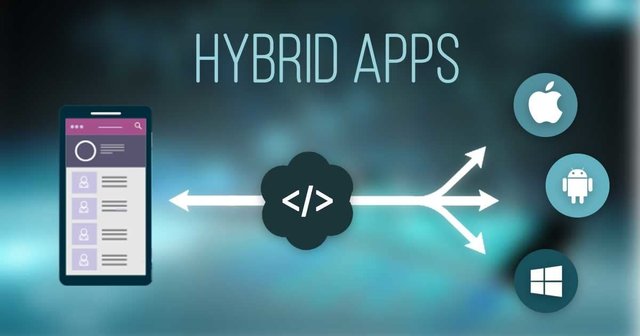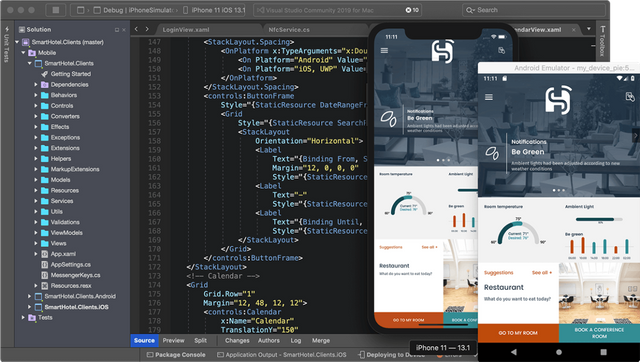How to Choose the Right Technology Stack for Mobile App Development
Mobile apps are continuing to gain eminence and stature in the business world. Every entrepreneur wants to increase retention, boost sales, and improve brand image. By far, one of the best ways to achieve these is by having your very own app.
Over the past few years, the mobile app sector has seen tremendous growth and demand is at an all-time high. By 2025, mobile apps are expected to rake in more than $613 billion in revenues. Everyone wants a piece of the pie and virtually every business is cognizant of the accessibility and usability of an app to their respective clients.
In case you are thinking of developing a functional and engaging app, you need to make a smart decision when selecting your technology stack. This is particularly true if you are considering hybrid app development or cross platform app development. In this article, we will take a close look at Xamarin and you’ll get to determine if it’s the right one for you.
Aside from brainstorming how an app is supposed to work and what resources will be needed to develop it, it is imperative to pinpoint which technology will suit your requirements and preferences. There is currently an assortment of mobile app technologies used for both cross platform and hybrid mobile app development.
Majority of app developers actually prefer designing and building hybrid mobile applications, as these allow them to write the code once and the apps can run on multiple platforms with ease. The app will work seamlessly on both Android and iOS platforms, and the code can be reused to create progressive web apps (PWAs) and even desktop apps.
Coming up with a promising app idea is not that difficult; it’s turning the idea into reality that is the challenging part. You have to choose the best mobile app development company and use the best technology for building your app.
Tips on Choosing an App Development Platform
A mobile app development platform is basically a toolkit that serves as a frame for your app. It offers a set of code libraries and SDK tools to help in building robust and efficient apps without starting from scratch.
There are several options available when it comes to mobile app design and development. If budget is a concern, you can build the app for a single platform, otherwise go for cross platform app development. Bear in mind that every platform has certain pros and cons. For instance, developing an app for only one platform increases the likelihood of losing as much as 50% of potential users.
You can choose from a variety of technologies for developing mobile apps. But in our honest opinion, hybrid mobile app development is the best to consider as it offers more advantages from a business perspective.
Hybrid Mobile App Development
Hybrid mobile apps are basically cross platform apps that combine elements of native and web applications. They are popular because they allow you to write the code once and still accommodate multiple platforms. Hybrid apps offer a user interface (UI) involving an embedded browser and languages such as CSS, HTML, and JavaScript. These apps are built using Cordova, Flutter, Ionic, Kotlin, React Native, Xamarin, among others.
Generally speaking, hybrid apps are similar to the applications you have on your mobile phone. They are available in the major app stores and they can do a variety of things like taking photos playing games, tracking your health, engaging with friends on social media, etc.
Just like websites, the design and development of hybrid mobile apps relies on a combination of web technologies. The characteristic feature of these applications is that they are hosted inside a native app that uses the WebView of a mobile framework. This allows such apps to access device functionalities like contacts, camera, etc. In addition, the native UI components are integrated in hybrid apps wherever necessary.
Advantages of Hybrid Mobile Apps:
- Easy code sharing is facilitated across multiple versions of the app across devices
- Faster development since the app’s core is built using web technologies
- The core of the app can be updated without going through the App Store
- Consistent and flawless UI/UX across iOS and Android platforms
- Offer a cost-effective option to reach out to more users using various mobile platforms
- Simple and seamless integration with other third party services
- High speed and impressive performance just like native apps. In some instances, hybrid apps are faster than progressive apps since there is no dependency on network communication.
Xamarin – Widely Regarded as the Best Cross-Platform App Development Technology
Xamarin is a Microsoft owned open source app platform for building modern and performant Android and iOS apps with .NET and C#. It allows app developers to share up to 90% of code across major platforms. No wonder it has established itself as the best when it comes to cross-platform implementations of the Common Language Specifications and Common Language Infrastructure.
Xamarin tools can be used by app developers with a C# shared codebase to write native iOS, Android, and Windows apps. The coding is eased and expedited by native UIs and code sharing across multiple app development frameworks.
Xamarin .NET/C#-based technology ranks at the top of all hybrid mobile app development platforms. The re-utilising capabilities of Xamarin help save time, while the shared code facility and exceptional tooling make it the best technology for building some of the best mobile apps.
According to figures released by the company, more than 1.4 million developers and 15,000 organizations were using Xamarin across 120 countries as of April 2017. Among their most notable clients are Bosch, Fox Sports, Siemens, Slack, The World Bank, Pinterest, among others. The fact that a number of industry leaders have relied on this platform proves its efficiency and reliability.
Here are a few more reasons to use Xamarin:
Native User Experience
Xamarin has complete access to native APIs and toolkits used on iOS, Android, and Windows platforms. As such, it can provide native (or near-native) performance for virtually every application. This is made possible due to the use of platform-specific components and technologies in C# and Visual Studio including Xamarin.Android, Xamarin.iOS, Xamarin.Essentials library, and Xamarin.Forms.
Single Technological Stack
Xamarin is easy to learn and a single language C# provides all kinds of solutions. There is also no need to switch between environments since you can accomplish everything in Visual Studio. This is very convenient because you do the same process using a single language instead of two.
Shareable Code
Xamarin is known as a ‘write once, run everywhere’ development platform because it generates up to 95% reusable code. This also means the app design will look the same everywhere. A single codebase can operate on different platforms, offering native performance and may only require minimal changes.
Cost and Time Savings
Since app developers can reuse the code on multiple platforms, the time required to develop an app is automatically accelerated. This means you can launch your app faster. In addition, there’s no need for two or more teams working on an app because everything is written in C#. The development process, testing, QA, and deployment are simplified when done by a single team, discarding extra expenses.
Testing
Xamarin offers comprehensive solutions to test (Xamarin Test Cloud) and track app performance and UI (Xamarin Test Recorder). These tools will allow you to run automated tests on multiple devices in the cloud and identify performance problems before launching the app.
When Should You Build a Hybrid Mobile App?
Before deciding which platform to use, you should evaluate both the technical and non-technical benefits of hybrid versus other alternatives, specifically those that are related to the requirements of your mobile app.
You may have lots of questions in mind, but those are necessary to achieve the best possible outcome. For instance:
- What mobile framework do you want to target?
- Will you distribute your app through App Stores?
- How technically advanced is your development team?
- Will the one-size-fits-all approach live up to the promise of a successful app?
Take into serious consideration the aforementioned questions and decide on an approach to go with. However, we are pretty sure that the hybrid mobile app development technology backed by Xamarin will work wonders for you.

.jpg)
